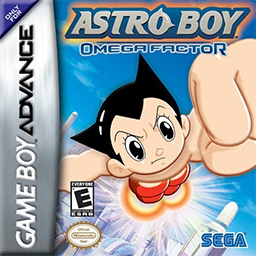397th played so far Genre: Action/Fighting
Genre: Action/Fighting
Platform: Gameboy Advance
Year of Release: 2003
Developer: Hitman/Treasure
Publisher: Sega
I don’t really know manga or anime. I’ve been exposed through some things (mostly through Peter), but it has never been a major focus of mine. Astro Boy seems like it’s a fairly major franchise – 4 seasons and nearly 200 episodes of the anime and 17 years of continuous publication since 1951, as well as various attempts afterwards to continue it. I would like to take this moment to say that I in no way apologize for exposing him to anime since it can be amazing and I need to show him a lot more of it.
Astro Boy: Omega Factor is one of the video games based on the series, apparently linked to a revival of the anime. To be honest, I have no clue what to expect.
Our Thoughts
The basics of Astro Boy are quite clear – 2D beat ’em ups like Viewtiful Joe or earlier Kung-Fu Master. You arrive at a screen, enemies swoop in and you get to fight them off. Your goal is to fight your way through various levels, rescuing characters and generally doing plot things.
The fighting is pretty standard group of foes swarming in, one wave at a time, and you beat them up – strategy and types vary, the area has some effect, but that’s what it comes down to. Some areas mix it up – there are a few hub-like levels where you spend more time exploring tunnels with static enemies, and a few others where there are more jumping puzzles, which at least add some variety. These exceptions basically have a greater Mega Man feel (in particular looking at the Zero series here), which seems to have a related setting (robot boy saving the world!), although there’s no weapon upgrade game at play here.
There are upgrades still, although they’re a bit less conventional. You gain them by getting to know people. It’s not entirely clear what the connection here is. The idea is that you gain a point to invest in one of seven stats, some improving specific weapons, defenses and other generic categories. You do this by helping out characters. Sometimes this is just meeting them and talking to them, in other cases you rescue them from some danger. There are a few characters that have a small quest to do – in one hub level this was finding another character for them, which seems indicative of the general quality. Mostly you seem to get there through just playing the game (making it a decent gating mechanic) but there are probably a few secret ones. One shame was that replaying levels doesn’t seem to be a thing (or else I didn’t get far enough to do so), making it easy to miss out on some of these.
The game clearly looks like a GBA game – an odd thing to say perhaps, but the sprite work, with some bright colours, has that feel to its palettes. It’s nicely done – the decades of manga will undoubtably have made that easier – but the enemies and looks were in parts bewildering to someone like me who doesn’t know the franchise.
Probably the nicest thing is that the beat-em up parts of the game aren’t just hand to hand, as often seen in similar games. You have a few ranged weapons (under the name of supers) that can be easily charged and allow you to either shoot around you or shoot the line ahead of you. When overwhelmed, they’re a lifesaver, and they’re strong enough to be useful anyway. It makes the game easier, true, but in a way that feels necessary. These powers come back in some side scrolling shoot’em up levels as well, playing like you’d expect them, again making for a more varied mix than most beat-em ups would be.
Final Thoughts
Astro Boy is a strong game. It might have its flaws, and it’s not the strongest in the genre, but in a crowded field it holds up well. The upgrade mechanics are interesting. Easily faked of course, and not meaningful in the long term, but ultimately very enjoyable to play with. It’s varied enough to hold your interest too, which helps a lot – although a lot of it is beating up enemies, enough of it isn’t that you are happy to do other things.
The game undoubtably caters more to fans of the series, which is fair enough. What it proves most of all, though, is that you don’t need to rely on it to make what still seems a recognisable game.